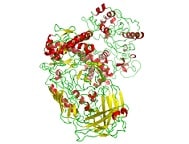Polymerase is the name given to the enzyme responsible for catalyzing the synthesis of certain biopolymers.
It is important that we know the etymological origin of the term polymerase that concerns us now. Specifically, it should be noted that it derives from Greek as it is the result of having joined the prefix "poly", which means "a lot"; the noun "meros", which is synonymous with "parts" and the suffix "-asa", which is used to give names to enzymes.
As you can see, to understand the term it is necessary to have several concepts clear.
 Let's start with the notion of enzyme . This is the name given to proteins (substances composed of chains of amino acids) that specifically catalyze a particular biochemical reaction of metabolism.
Let's start with the notion of enzyme . This is the name given to proteins (substances composed of chains of amino acids) that specifically catalyze a particular biochemical reaction of metabolism.
The verb catalyze , meanwhile, refers to producing catalysis (accelerating a reaction), while synthesis allows obtaining a compound from simpler substances. A biopolymer , finally, is a polymer (chemical compound formed by polymerization and developed through the repetition of structural units) that acts in biological processes.
Returning to the idea of polymerase, we can say that it is a particular type of protein (an enzyme ) that allows certain chemical compounds ( biopolymers ) to be synthesized more quickly . Its most important function is linked to nucleic acids : ribonucleic acid or RNA and deoxyribonucleic acid or DNA .
Polymerases enable the transcription of these acids . In the case of RNA polymerases , they use ribonucleotides to achieve RNA synthesis starting from a DNA sequence that acts as a kind of template. DNA polymerases , for their part, pair complementary deoxyribonucleotides with triphosphate deoxyribonucleotides to synthesize new DNA strands.
Finally, it is known as the polymerase chain reaction , a technique created by the American biochemist Kary Mullis in 1986 . Called PCR for the English expression polymerase chain reaction , this resource is used to generate multiple copies of a small DNA fragment, which is useful for detecting viruses or bacteria, identifying genetic fingerprints or diagnosing some disorders.
Precisely, PCR is a test that has experienced a great boom since 2020. And it is the one that is being used at all times to be able to know if a person is infected with coronavirus.
Since then, properly trained health professionals have been carrying out these PCR tests on citizens who present symptoms of suffering from Covid-19. Basically what they do is insert a type of swab into the nose or throat to obtain the relevant sample. Sample that is kept in a secure container to be sent to the laboratory where it will be analyzed.
In the laboratory what is done is to study said sample and for that, everything from primers and nucleotides to an enzyme that responds to the name of reverse transcriptase takes center stage.
It is interesting to know that this polymerase test at hand is considered one of the most important scientific advances of the 20th century. So much so that she was awarded the prestigious Nobel Prize in Chemistry in the 1990s, more specifically in 1993.
